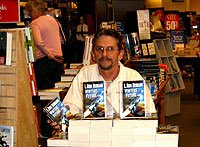Walking a darkened street in a noir mystery city, peeling back today step by step, hearing rainfall as the sky darkens once the sun drops below the uneven skyline. It's not heavy rain, but a light shower lifting odors off the sidewalk, the strip of grass with small maple trees every hundred feet. Their leaves are beginning to turn September into October.
The sounds of traffic lessen as evening progresses and your steps lead you away from the vibrant heart of entertainment. You seek solace where most would not look for it, turning a corner when the white and colored neon lights from a neighborhood tavern a block away grab your attention.
Rain on the sidewalk fills cracks and holes, softening the sound of your leather-soled footsteps. The road is out of the way enough that traffic becomes infrequent, and when a car rolls by the tires hiss the water accumulating on the pavement as twists of smoke rumble from the exhaust pipe beneath the chrome rear bumper.
Nearing the tavern, you hear the muffled sounds of voices, light laughter, in the background someone playing an upright piano, you discover as you press your hand to the door slowly opening and entering.
The air feels warm, even inviting, which is when you realize that outside the temperature drops with nightfall. You smell the smoke from cigarettes and cigars, beer and perfume and the people all around the room. Several of those sitting along the wood-topped bar glance back to see who entered.
You reach up and touch the brim of your fedora, a greeting, everyone understands. Several of them nod, or smile a welcome.
You cross the room, noticing the scuffed oak flooring to get closer to the musician. Several women stand to one side watching and listening as his fingers caress the ivories.
A pay telephone hangs to the right of the piano where a small hallway leads back to the restrooms.
On the top of the piano sits a tumbler with a few old dollar bills stuffed inside.
You glance around, spot an empty table, then sit, and wave over the waitress after you hang your overcoat and hat on the brass hook mounted on the wall beside the table.
The waitress looks like a girl you once knew, but now a dozen years older. Strands of her straw colored hair, held back in a ponytail, slipped free, and she blows it away when it dangles before her light blue eyes. Her red lipstick needs refreshing, red nail polish looks chipped. She wears a light green, bibbed dress that hangs below her knees with a lightly soiled yellow apron tied around her narrow waist.
She pulls her hips to the left when a guy at the bar reaches out to pat her. But her face lights with a grin as she shakes her head and says, "Watch where you try to put that hand of yours, buster."
"Can't blame a guy for trying, Pam," he answers, grinning too, and you find yourself feeling more comfortable than you suspected you might when you first entered.
"What can I get you?" the waitress asks, still smiling, when she stops alongside your table.
"I'll have a Reingold on tap and some peanuts if you've got them," you tell her and hand her a dollar.
"Be right back," she says and you again wonder if she's that girl you knew back in the old neighborhood.
Across the room, you see a new jukebox; lights marching up over and down the neon panel-like mantel. A stack of small 78s wait for a nickel to be inserted, lifting and lowering the chosen disk beneath the metal arm with a needle to draw out the wailing voices and back up instrumentals.
Alongside the jukebox, you spot two older men. Neither seem interested in anything but each other. Because of the way they lean forward, their creased foreheads and the silent but obviously angry words they pass back and forth, you unbutton your suit jacket, and let your fingers caress the gnarled grip of the .38 sitting in a worn leather holster under your left arm. You know both men, hoped you might avoid them by coming to that particular neighborhood, and now wait with uncomfortable anticipation for them to see you.
To be continued



























